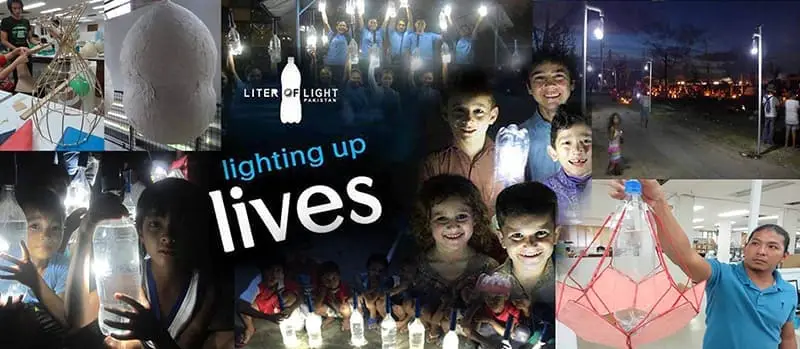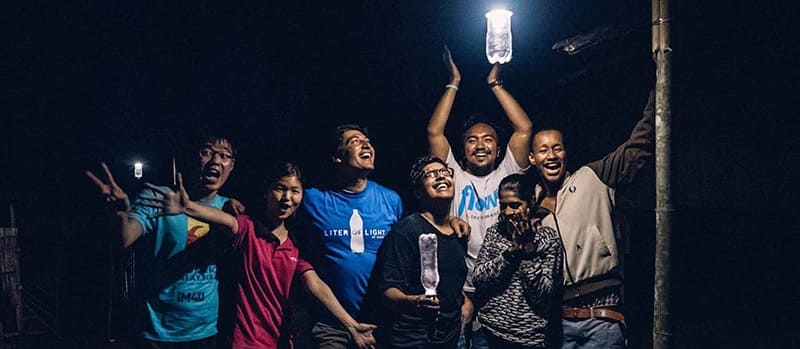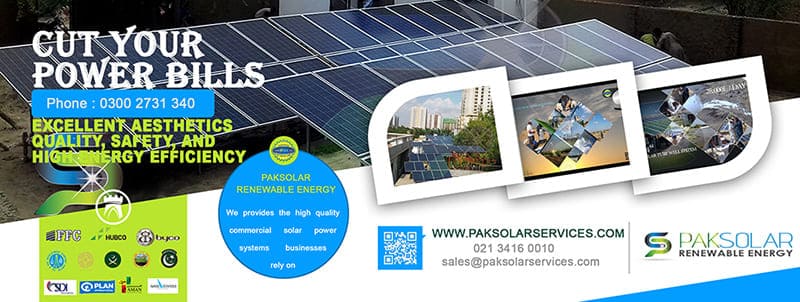These Off Grid Solar Lights Are Made By The Communities Who Use Them
Liter of Light works with women's cooperatives to make solar lights from simple parts, instead of sending them solar lights that don't work the way they want them.
When solar lights or other small solar projects are sold or donated to off-grid communities, the ending isn't always as expected: If something breaks and no one made a decent plan for repair, it's possible the product will end up in the trash.
After seeing this happen in the Philippines, social entrepreneur Illac Diaz decided to take a different approach. Instead of importing solar products, his organization, Liter of Light works with the local community to make everything locally. Repairs and replacements become simple.
"One of the things micro-solar products don't tell us is that it hasn't really been that successful in the developing world," Diaz says. "The products are designed to fail. When parts break, there's nothing to fix it. I see large amounts of solar thrown in landfills. The real gift is to teach us to have our own solar industry—so we can make it here, find local parts to repair it, and grow it from the bottom up, not top down."

Liter of Light works with women's cooperatives to make simple solar lights from a handful of parts, including both recycled components and a new high-tech chip guaranteed to make the light last 70,000 hours. Everything is packaged in a recycled water bottle to protect the components. The water bottles are covered with handcrafted woven shades, providing a new outlet for local basket-weaving skills that are no longer in much demand.
The community-based approach provides a steady supply of everyday products and is also designed to provide a quick response to disasters like Typhoon Haiyan. "When a storm can hit 14 million houses and wipe it out in 24 hours, you really need a new kind of response," says Diaz. "You can't wait for foreign agencies to come in."
After a disaster, supplies are often slow to arrive. "Usually people think we're flooded by things like solar lights, but you have to wait for your turn in the production cycle, taking sometimes two to three months," he explains. "Then you have a shipment and customs. By the time the solar lights actually hit this kind of large-scale devastation, it's usually like six to seven months too late."
Liter of Light has trained an "army of student volunteers" to make the lights, so when a disaster occurs, they will be able to spring into action, providing construction and making water filtration equipment along with the lights. The lights can be used for homes, but the organization also provides street lights for safety, a need that Diaz says is often overlooked.
In the two years that the organization has been in operation, it has distributed 360,000 lights in 15 chapters around the world. Diaz hopes to reach 1 million lights by the end of next year, and provide an alternative to other technology that is typically sold through micro-credit or, in some cases, donated but then not supported.
"We're trying to explain that there should be some type of independence," he says. "If you really want to help people move out of poverty, one of the most important things to do is teach us the skills of what to do—like how to make and repair solar. Unless skills and technologies are turned over, we can never build a social enterprise big enough to help the real bottom of the pyramid."
Diaz is one of this year's TED Fellows, and will be speaking at TEDGlobal2014.






